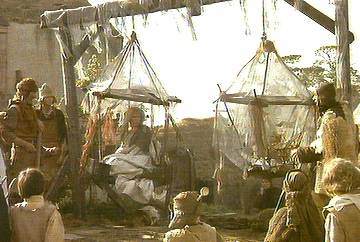
Word of the Day: Measure
Measure: this is one of those interesting words in English that is both a noun and a verb. I am pretty sure that today we use it more often as a verb than as a noun: “I need to measure the room.” In fact, we probably use the noun measurement far more often than the noun measure. But we’re going to focus on the noun measure, which means “a unit or standard of measurement.” According to www.etymonline.com, the word means “moderation, temperance, abstemiousness” around 1200 CE, “instrument for measuring,” around 1300 CE, and comes “from Old French mesure ‘limit, boundary; quantity, dimension; occasion, time’ (12c.), from Latin mensura ‘a measuring, a measurement; thing to measure by,’ from mensus, past participle of metiri ‘to measure,’ from PIE root *me– (2) ‘to measure.’ The native word was Old English cognate mæð ‘measure.’” That Old English word is pronounced like modern English math.
On this date in the year 392 CE, according to the OnThisDate website, the Roman Emperor Theodosius declared Christianity the official state religion of the Empire. The relationship between Christianity and the Roman Empire was a roller coaster ride. In 64 CE, the Emperor Nero blamed Christians for a fire that burned in Rome for a week. In 93 CE, the Emperor Domitian began persecuting Christians for refusing to pay proper respect to the Emperor and the Roman gods. In 250 CE, the Emperor Decius led a major persecution of Christians, actually trying to eliminate Christianity from the Empire. Then, in 312 CE, Constantine the Great converted to Christianity. There is a famous story about a vision Constantine had before a big battle; in the vision, he saw a cross with the words in hoc signo vinces (“in this sign you will conquer”). Now, it is true that Constantine’s mother was a Christian, so the conversion shouldn’t be too surprising—we all do what our mothers tell us, right?
Constantine issued the Edict of Milan in 313, declaring tolerance for the Christian religion. And it was under Constantine that the Council of Nicaea, one of the most important moments in the history of the church, was held in 325. But it took the rest of the century before Theodosius, the last emperor to rule both the Eastern and Western Empires, made Christianity the official religion.
We should remember this day (or whatever day it was—historians differ) as one of the saddest days in the history of Christ’s church.
Making Christianity the official religion led to the persecution of the old Roman religion. In other words, the kind of suffering endured by Christians for 250 years was inflicted on worshippers of the old religion by the Christians. How could they do that? Because suddenly the Christians had the political power needed to persecute others. And particularly in the Western Roman Empire and the nations that followed it after the collapse of the Western Empire, that political power continued for a very long time. And why is that a problem? Very simply, as Lord Acton famously said, “Power tends to corrupt, and absolute power corrupts absolutely.”
The problem is that people who find themselves in positions of power, whether it is governmental power or power within private organizations, tend to abuse that power. And they especially seem to use that power against the powerless, taking advantage of them and repressing them, and (worst of all) justifying the oppression by calling on their religious position. Think about the Spanish, who justified the near extermination of the indigenous peoples of South and Central America by saying that they were converting the natives.
Now, I’m not suggesting that people in positions of authority should never use that authority to chastise people who have gone wrong. But the chastisement needs to be tempered with mercy. And, perhaps most important of all, when people in positions of authority judge others, they need to keep in mind their own faults, their own weaknesses, as they judge others. As our Lord says, “Judge not, that you be not judged. For with the judgment you pronounce you will be judged, and with the measure you use it will be measured to you” (Matthew 7:1-2). Or, as Shakespeare’s Duke Vincentio says,
He who the sword of heaven will bear
Should be as holy as severe;
Pattern in himself to know,
Grace to stand, and virtue go;
More nor less to others paying
Than by self-offences weighing. (Measure for Measure 3.2)
Sadly, far too many people in positions of authority, including judges, politicians, priests, and college presidents, are far more severe than they are holy. And it serves as only small consolation that eventually those people will be measured by the measure they use to judge the downtrodden.